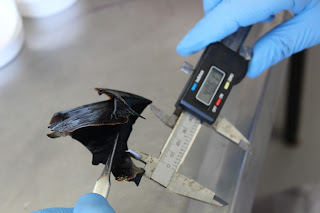“Após tantos anos
de cientista, ainda não descobriste tudo?” Boa pergunta. Tem uma resposta
simples e humilde: Não. Interessante que esta pergunta é-me feita regularmente,
principalmente nas escolas. Vamos por partes. Ser biólogo marinho, alguém que
estuda o mar, exige ir à Antártida várias vezes...para recolher amostras (ou colegas as recolhem por mim). Mas tudo depende
da pergunta que se pretende responder. Por exemplo, para estudar o que os
pinguins rei na Geórgia do Sul comem, bastará ir uma vez. Mas imagina que
queres estudar o que eles comem em redor da Antártida, então terá de se ir
várias vezes. E para estudar se as suas dietas variam entre anos? E se
quisermos estudar a dieta das focas também? E dos albatrozes? Os anos vão
certamente acumulando, e serão cada vez mais...tudo dependendo da pergunta que
se deseja responder.
Neste exemplo, ao estudar a dieta dos pinguins, poderemos
também saber se come espécies que são capturadas também comercialmente por
barcos de pesca (como os peixes do gelo – Icefish), ou seja eles estão a
competir diretamente com as pescas. Ou alternativamente, os pinguins capturam espécies
que não existem pescas dirigidas a elas, como as lulas da Antártida. Elas são
extremamente raras e ainda hoje, são ainda literalmente desconhecidas....temos
lulas que ainda não as conhecemos e possuem nomes como A, B ou C....por
exemplo, na dieta dos albatrozes que estou a estudar nesta viagem à Nova
Zelândia, temos Moroteuthis sp. B
(Imber) ou Taonius sp. (Clarke).
Recentemente finalmente saiu um artigo em que classificou os bicos de lulas a
que eu chamava ?Mastigoteuthis A
(Clarke) como lula Asperoteuthis lui.
E ainda esta semana, estou a descobrir bicos de lulas e polvos
desconhecidos...exemplos de lições que eu não sei tudo continuam diariamente....
“After so many years of being a scientist, don´t you
know everything by now?” Good question. It has a simple and humbling answer:
no. Interesting that this question is done to me regularly, particularly in
schools. Funny enough, numerous children think that it is easy and that
knowledge is at a distance of a click of a computer. But in numerous occasions,
it is not easy. Answering by steps. Being marine biologist, someone that
studies the Ocean, I have to go the Antarctic to collect the material I need to
examine (we call them samples)...numerous times (unless colleagues collect the
samples for me).
Everything depends on the scientific question we are trying to
answer. For example, to study what king penguins from South Georgia eat, I
would just need to go once to the field. But imagine that I want to know what king penguins
all around the Antarctic eat ? I would have to go more times there. And to assess
differences between years? And compare with the diets of seals? And of
albatrosses? The fieldwork seasons to the Antarctic surely pile up. But everything depend on the
question you are trying to address.
In this example, studying the diet of
penguins, we could also ask if the prey species they are catching are the same
that local fisheries are catching (example, icefish), which tells us that both
might compete for icefish. Alternatively, penguins may catch prey naturally,
with no fisheries directed to them, such as Antarctic squid. Adult Antarctic pelagic squid are
extremely rare to catch and still today, some are still unknown to science. We still
have squid species that we call A, B or C...as examples, in the diet of the
albatrosses I am studying in this
research trip to New Zealand, I encountered Moroteuthis sp. B (Imber) and
Taonius sp. (Clarke). Recently there was a research article by colleagues (Heather Braid & friends) that finally
attributed the beaks of ?Mastigoteuthis A (Clarke) to the squid
Asperoteuthis lui. And still this week, I came across squid and octopod beaks
unknown to me....all of these are examples reminding me that we do not know everything occur
EVERYDAY ;)






Sem comentários:
Enviar um comentário